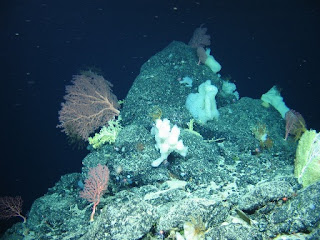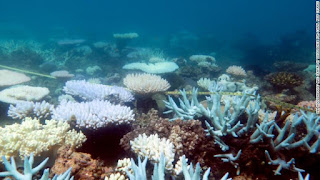1. Algae Bloom Obliterates Two British Columbia Fish Farms


Algae blooms killed around 250,000 salmon at two British Columbia fish farms last week. About half of the fish at Grieg Seafood’s farms in Jervis Inlet died from the harmful blooms of Heterosigma algae, according to a release by the company. Because the algae was in “extraordinarily high concentration” and spread throughout the water, protective measures could not prevent the extensive kill, it said.
-----------------------------------------------
 Less than two weeks after a pilot whale died off Thailand with 80 plastic bags in its stomach, three major companies- SeaWorld, Ikea and Royal Caribbean - have vowed to remove plastic straws and bags from their properties. The companies are now linked to a host of businesses, governments and others across the world that have joined an effort to dramatically reduce the 8 million metric tons of plastic that pollute oceans each year — “one garbage truck into the ocean every minute,” according to a 2016 report released by the Ellen MacArthur Foundation.
Less than two weeks after a pilot whale died off Thailand with 80 plastic bags in its stomach, three major companies- SeaWorld, Ikea and Royal Caribbean - have vowed to remove plastic straws and bags from their properties. The companies are now linked to a host of businesses, governments and others across the world that have joined an effort to dramatically reduce the 8 million metric tons of plastic that pollute oceans each year — “one garbage truck into the ocean every minute,” according to a 2016 report released by the Ellen MacArthur Foundation.-----------------------------------------------
3. Scientists Explore Mid-Atlantic Ridge, Discover Dramatic Mountain Range
 A multi-national team of ocean exploration experts led by Dr. Aggie Georgiopoulou, University College Dublin, returned to Galway on World Ocean Day (8th June 2018) after spending three and half weeks exploring and mapping the tectonic spreading at the Charlie-Gibbs Fracture Zone of the Mid-Atlantic Ridge on the Marine Institute’s RV Celtic Explorer. Using the remotely operated vehicle Holland I, “we collected spectacular film footage of sponge gardens and even a skate nursery at 2000m under the sea. A discovery of more than 70 skate eggs was found, which is a first for the deep-sea” explained Chief Scientist Dr. Aggie Georgiopoulou.
A multi-national team of ocean exploration experts led by Dr. Aggie Georgiopoulou, University College Dublin, returned to Galway on World Ocean Day (8th June 2018) after spending three and half weeks exploring and mapping the tectonic spreading at the Charlie-Gibbs Fracture Zone of the Mid-Atlantic Ridge on the Marine Institute’s RV Celtic Explorer. Using the remotely operated vehicle Holland I, “we collected spectacular film footage of sponge gardens and even a skate nursery at 2000m under the sea. A discovery of more than 70 skate eggs was found, which is a first for the deep-sea” explained Chief Scientist Dr. Aggie Georgiopoulou.
Read more... A multi-national team of ocean exploration experts led by Dr. Aggie Georgiopoulou, University College Dublin, returned to Galway on World Ocean Day (8th June 2018) after spending three and half weeks exploring and mapping the tectonic spreading at the Charlie-Gibbs Fracture Zone of the Mid-Atlantic Ridge on the Marine Institute’s RV Celtic Explorer. Using the remotely operated vehicle Holland I, “we collected spectacular film footage of sponge gardens and even a skate nursery at 2000m under the sea. A discovery of more than 70 skate eggs was found, which is a first for the deep-sea” explained Chief Scientist Dr. Aggie Georgiopoulou.
A multi-national team of ocean exploration experts led by Dr. Aggie Georgiopoulou, University College Dublin, returned to Galway on World Ocean Day (8th June 2018) after spending three and half weeks exploring and mapping the tectonic spreading at the Charlie-Gibbs Fracture Zone of the Mid-Atlantic Ridge on the Marine Institute’s RV Celtic Explorer. Using the remotely operated vehicle Holland I, “we collected spectacular film footage of sponge gardens and even a skate nursery at 2000m under the sea. A discovery of more than 70 skate eggs was found, which is a first for the deep-sea” explained Chief Scientist Dr. Aggie Georgiopoulou. -----------------------------------------------
4. Shrimp Species With 'Extremely Hairy Feet' Named For Bilbo Baggins
 If you’re a fan of JRR Tolkien’s The Lord of the Rings, then you’ll be excited to learn that a newly discovered shrimp species has been named after Bilbo Baggins, the Hobbit who started the entire fantastical quest when he accidentally obtained the One Ring of power from Smeagol. A new species of shrimp found in Indonesia has been named after Bilbo Baggins because of its small size and eight extremely hairy pereiopods -- feet -- and inspired its fanciful scientific name, Odontonia bagginsi.
If you’re a fan of JRR Tolkien’s The Lord of the Rings, then you’ll be excited to learn that a newly discovered shrimp species has been named after Bilbo Baggins, the Hobbit who started the entire fantastical quest when he accidentally obtained the One Ring of power from Smeagol. A new species of shrimp found in Indonesia has been named after Bilbo Baggins because of its small size and eight extremely hairy pereiopods -- feet -- and inspired its fanciful scientific name, Odontonia bagginsi.-----------------------------------------------

Antarctica is melting, and it’s happening at a much faster rate than scientists previously anticipated. According to a study published in Nature on Wednesday, losses in Antarctica’s ice sheets—which hold 60 to 90 percent of Earth’s fresh water, The New York Times’ Kendra Pierre-Louis notes—have tripled since 2007. The study presents the most comprehensive analysis of Antarctic ice loss to date, drawing on 24 surveys conducted by 84 scientists from 44 institutions. These researchers estimate that a decade ago, Antarctica lost ice at a rate of 73 billion metric tons per year. Now, that figure is up to 219 billion tons of ice lost per year, a staggering rate that scientists say, could raise sea levels six inches by 2100.
Read more...
-----------------------------------------------
6. Great Barrier Reef - Gets Fertility Treatment
 A coral fertility treatment designed to help heal damaged parts of Australia's Great Barrier Reef is showing signs of success and now needs to be scaled up to create a bigger impact, the lead scientist tells CNN. Peter Harrison, a professor at Southern Cross University in Australia, said he is "excited by the results" which show the experimental process known as "coral IVF" is working on a small scale. Recently returned from a trip to the reef, Harrison said his team managed to "significantly increase" the numbers of baby coral on reefs at Heron Island and One Tree Island, where they laid millions of coral larvae 18 months ago.
A coral fertility treatment designed to help heal damaged parts of Australia's Great Barrier Reef is showing signs of success and now needs to be scaled up to create a bigger impact, the lead scientist tells CNN. Peter Harrison, a professor at Southern Cross University in Australia, said he is "excited by the results" which show the experimental process known as "coral IVF" is working on a small scale. Recently returned from a trip to the reef, Harrison said his team managed to "significantly increase" the numbers of baby coral on reefs at Heron Island and One Tree Island, where they laid millions of coral larvae 18 months ago.
-----------------------------------------------
Be sure to "LIKE" http://facebook.com/SeaSave to ensure our "Week in Review" is delivered to your newsfeed every Friday.
Sea Save Foundation is committed to raising awareness of marine conservation. The Week in Review is a team effort produced by the Sea Save staff to provide a weekly summary of the latest in marine research, policy, and news.